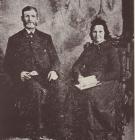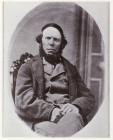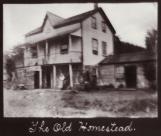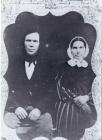1
Roads played an essential role in the development of the village of Greenbank. The area north of Scugog had been surveyed and opened to settlement since 1825 but few families were fulfilling their settlement obligations due to the lack of proper roads and mills. In 1827 the Lake Scugog area was thoroughly examined and the importance of creating roads to open up the northern front was established. Following this recommendation, Simcoe Street, leading north from Oshawa, and Centre Road leading north from the harbour in Whitby, were cut. Both roads were originally only rough wagon tracks, with corduroy bridges laid down to cross the creeks and rivers. At that time, Centre Road only went as far as Fitchett's Corners (now the village of Manchester). The plank road was built by the government then sold to a private company, which turned it into a toll road to help pay for its upkeep. The planks were three inches thick and twelve feet long, and were cut at Paxton & Way sawmill in Port Perry. It was expected that planking would be cheaper than gravel, however the planks did not hold up for long, due to the constant wear caused by horseshoes in the winter.Old Brock Road, the third road to open up the northern parts of Reach Township, was created in 1831. It originally ran north from Whitby to Epsom. In 1833 three families, the Dobsons', Craggs' and Bassingthwaites', followed this road, and then a trail leading north from Epsom, to establish their homesteads on the 9th and 11th Concessions.
In 1855 the Council of Reach passed a by-law to widen and improve Old Brock Road along Lot 11 in the 12th Concession. The rnew oad actually ran right through Lot 11. It was here, at the junction of Old Brock Road and the 11th Concession that the village of Gimlet Town was established with the homes of the Isaac Cragg and Edward Bassingthwaite. Both men were instrumental in establishing the first church, school, cemetery, store, inn and post office.
In 1860 Centre Road was extended north from Manchester to Greenbank. Many said that it could not be done due to the low-lying swamps, and many did not want it done as it would take business away from Gimlet Town. Timothy Cragg surveyed the area with a compass and decided that the road could indeed be run north to the 12th Concession and beyond if needed. Abel Ewers, Deputy Reeve of the Township and a carriage-maker in Manchester, was another strong proponent for the road. One year after the Centre Road was in place, it was remarked that Old Brock Road north of Epsom was "worn in many places into deep gutters by heavy rains thereby leaving large stones exposed making it almost impassable." The commercial centre of the area shifted to the new village at the junction of Centre Road and the 11th Concession. Today there are no traces of the Old Brock Road remaining.
The Centre Road was finally paved in 1923. The road was raised using dirt from the ditches, and the labour of men with their horse and wagon teams and slush scrapers, to scrape up and dump the earth as needed. They used gravel from McArthur's Pit at Lot 11, Concession 10. George Cragg, the cook at the gravel pit, made 20 - 25 pies each day to feed the hungry workers. At that time "statute labour" existed which required all men to spend a certain amount of time each year working on the roads.
2
Road and Railway Map, Reach Township1821-1860
Greenbank, Reach Twp., Ontario, Canada
 Credits:
Credits:Greenbank: Country Matters in 19th Century Ontario, W.H. Graham, Broadview Press, 1988.
3
Robert and Martha Dobson1880
Greenbank, Reach Twp., Ontario, Canada
 Credits:
Credits:The Descendants of Robert Dobson, Earle Francis Dobson, Uxbridge Printing Company Limited, 1969.
7
Doings at Greenbank6 August 1868
Greenbank, Reach Twp., Ontario, Canada
THE DOINGS AT GREENBANK
The 31st ult., being the day appointed for the Grand Entertainments at Greenbank, we found at a very early hour in the morning that quite a large number from these villages had made up their minds to join their Greenbank friends in the enjoyments of the day, and in pushing on the laudible object contemplated in the movement, viz: the completion of their tidy and excellent edifice, wherein to worship the "God of their fathers." Everything which could at all be called a horse (not including the saw horse) was eagerly sought after, and high figures were no hindrance to the closing of a bargain; while conveyances of every description - except cutters - were picked up without ceremony, and by eight o-clock in the morning, every quadruped larger than the dog (we don't include sheep or cattle) was either on its way towards Greenbank, or being fitted up for the journey. So soon as we could get off we sought the charmed spot. In driving along the Centre Road from Manchester to Greenbank - which, with very little repair, would be one of the best roads in the county - we could not help tracing back only a few years; first, to the time when this road had no existence as such; second, to the time when only a few daring teamsters dared venture it, and thirdly to the present time when it is one of the most pleasant and agreeable drives to be found any where in the county. In drawing this pleasing contrast, we were naturally led to associate with these vast and important improvements the name of our energetic and respected townsman, Abel W. Ewers, Esq. - We can well remember the time when there was no road here, and that gentleman commenced to fight for it, when he drew upon himself that, mistrust that jealousy, than censure and punishment which conflicting local interest are sure to bring upon the head of that party who takes hold of any public improvement with zeal and enthusiasm. But Mr. Ewers was of sterner stuff than be driven from his position by any means; he found he was right and set himself to the work fearless of consequences; while every fresh stumbling block cast in his way by interested parties only called forth more energy to remove the difficulties, and wherever Mr. Ewers was found at that time, in season and out of season at our Township Council Board, as well as at that of the County he proved himself the able and fearless advocate of this road; until, convincing some, bullying others, and tiring the rest, he finally succeeded in carrying his point; and having done so, he never lost sight of it until the road was all that he had promised, and the results proved ever greater than predicted. We asked ourselves in driving pleasantly along: Do the vast number of farmers and others, who gladly avail themselves of the many advantages presented by this road ever ask themselves to whom are they most indebted for that excellent outlet for the produce of their fields. Very many of them can look back to the time when 15 bushels of wheat (it was only the more reckless who risk 20 bus.) was all they dare put on, and even then they would have to work their way to market by many circuitous routes and with no small risk to the wagon. Now, however, the Centre road leads in a direct line to one of the best markets in the province, and four times the quantity can be taken to the market in much less time, with much more care, and almost entirely free from risk. - Yes the party who has been chiefly instrumental in accomplishing this important work has done more for the large number of farmers who get the advantage of it than if he had permanently given them five cents more than the market price for every bus. of wheat they raised; for the difference in cost of taking to market now and then is more than five cents per bushel; and, to be plain about it, we believe that if this road had not clashed with local interests, the man who had the honor of fighting it through would not have been till now without some tangible token of the gratitude of an appreciative public, especially of those whose material interest are so largely promoted by the work; and we believe and hope that time is not far distant when steps will be taken to repair this blunder and give honor to whom honor is due in this particular.
On arriving at Greenbank we found that a large number from the various villages and surrounding country had already put in an appearance. As part of the Band - owing to a breakdown - had not yet arrived, operations were delayed, and people scarcely knew what to do with themselves in the meantime. Still the people continued to pour in from all directions and by the time that the Band was ready to go to the grounds there was a pretty large number present, but not nearly as many as would have been had a more suitable time been selected. As it was however, there was a fair gathering, and no room for complaint on the score of officialty. Amongst other leading parties present, we observed the M.P.P. for North Ontario, the Sheriff of the County, also the warden, the reeves of Uxbridge and Reach, four of Reach Council, and the Township Clerk. The President and Engineer of the Port Whitby and Port Perry Railway Company, &c., &c.
The Band went to the ground about three o'clock and played full between five and six. There might be nearly 300 in the shed in the afternoon; and we should judge there might be over 250 at the concert in the evening. We think no one could be disappointed with the performance of the Band, even those whose anticipations were highest must have got more than they expected. The vocal part of the entertainment was far from being up to anticipations. There was little of that offered, and it is just as well for the shed was not adapted in any way for musical performances either vocal or instrumental; especially the former.
The Concert opened with an excellent piece from the Band, followed by a comic song by Dr. Hillary. The Dr. is particularly at home in the comic strain, and received a hearty encore. After another piece from the Band, Mrs. Reid sung a fine piece and accompanied it on the piano, but the effect of the lady's voice was much injured by the unsuitableness of the place. She is an excellent pianist. Dr. Knowlys followed the next piece by the Band, he sung "Bonnets of Bonny Dundee" in such a style as called forth a rattling encore. Dr. Hillary on the violin and Mr. D. Adams on the flute performed a capital piece together.
The Greenbank friends left nothing to be desired on the score of hospitality. Many of their tables were free, Dr. Knowlys threw open his door and Mr. Love spread a table in the grove and invited all partake of the excellent things provided by this good lady. We prefer however patronizing the houses kept for public accommodation and therefore dined at the Greenbank Hotel. We have not seen a better spread for a long time, a prime Turkey of the largest dimensions and cooked to a nicety, graced the head of the table, while an abundance of everything necessary to constitute a first class dinner was plentifully spread over the table; while this does honor to the skill and industry of the hostess, it is a credit to the house. About half past ten the rattling of carriages indicated that the fete champetre had drawn to a close, and people were seeking the quietude of home.
The entertainments upon the whole were very good; In fact no one could listen to that excellent band and come away dissatisfied; but had the committee attended a little better to their duties, matters would have gone off much more satisfactorily for all; and had a better place been secured for the Concert the music would have give still more satisfaction. We hope the entertainments have been a success financially. Greenbank has certainly been highly favored in securing the services of this admirable Band; and when she holds her next year's fete champetre, she will rectify the little mistakes she made this time, by selecting a less busy season and sticking the committee a little more closely to their duties.
Credits:
North Ontario Observer, August 6, 1868


